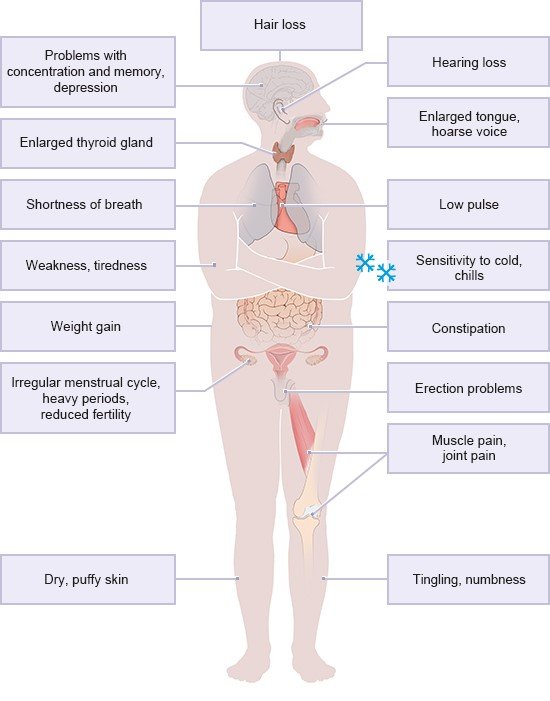Bekkering GE, Agoritsas T, Lytvyn L et al. Thyroid hormones treatment for subclinical hypothyroidism: a clinical practice guideline. BMJ 2019; 365: l2006.
Bundesinstitut für Risikobewertung (BfR). Jodversorgung in Deutschland wieder rückläufig – Tipps für eine gute Jodversorgung. 2021.
Bundesinstitut für Risikobewertung (BfR). Verwendung von Mineralstoffen in Lebensmitteln. Toxikologische und ernährungsphysiologische Aspekte. Teil II. Berlin: BfR Wissenschaft; 2004.
Chaker L, Bianco AC, Jonklaas J, Peeters RP. Hypothyroidism. Lancet 2017; 390(10101): 1550-1562.
Deutsche Gesellschaft für Allgemeinmedizin und Familienmedizin (DEGAM). Erhöhter TSH-Wert in der Hausarztpraxis (S2k-Leitlinie). AWMF-Registernr.: 053-046. 2023.
Gesellschaft für Neonatologie und pädiatrische Intensivmedizin (GNPI). Neugeborenen-Screening auf angeborene Stoffwechselstörungen, Endokrinopathien, schwere kombinierte Immundefekte (SCID), Sichelzellkrankheit, 5q-assoziierte spinale Muskelatrophie (SMA) und Mukoviszidose (S2k-Leitlinie, in Überarbeitung). AWMF-Registernr.: 024-012. 2024.
Jameson JL, Mandel SJ, Weetman AP. Disorders of the Thyreoid Gland. In: D. L. Kaspers, S. L. Hauser, J. L. Jameson et al. (Ed). Harrison's Principles of Internal Medicine. McGraw-Hill Education; 2015.
National Institute for Health and Care Excellence (NICE). Thyroid disease: assessment and management. 2019.
Pearce SH, Brabant G, Duntas LH et al. ETA Guideline: Management of Subclinical Hypothyroidism. Eur Thyroid J 2013; 2(4): 215-228.
Persani L, Brabant G, Dattani M et al. 2018 European Thyroid Association (ETA) Guidelines on the Diagnosis and Management of Central Hypothyroidism. Eur Thyroid J 2018; 7(5): 225-237.
Reyes Domingo F, Avey MT, Doull M. Screening for thyroid dysfunction and treatment of screen-detected thyroid dysfunction in asymptomatic, community-dwelling adults: a systematic review. Systematic Reviews 2019; 8(1): 260.
Schübel J, Feldkamp J, Bergmann A et al. Latente Hypothyreose des Erwachsenen. Dtsch Arztebl Int 2017; 114(25): 430-438.
UK National Screening Committee (UK NSC). Screening for thyroid dysfunction in adults. External review against programme appraisal criteria for the UK National Screening Committee (UK NSC). 2018.
IQWiG health information is written with the aim of helping people understand the advantages and disadvantages of the main treatment options and health care services.
Because IQWiG is a German institute, some of the information provided here is specific to the German health care system. The suitability of any of the described options in an individual case can be determined by talking to a doctor. informedhealth.org can provide support for talks with doctors and other medical professionals, but cannot replace them. We do not offer individual consultations.
Our information is based on the results of good-quality studies. It is written by a team of health care professionals, scientists and editors, and reviewed by external experts. You can find a detailed description of how our health information is produced and updated in our methods.


